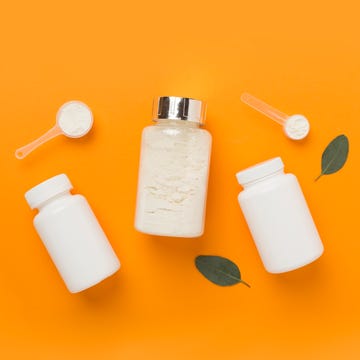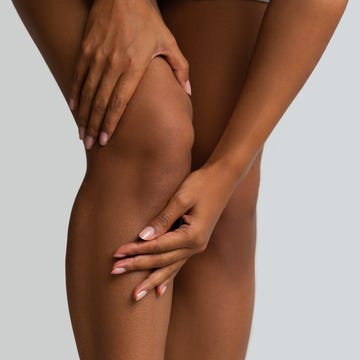If you share a house with teenagers, it’s a debate you’re likely having constantly (even desperately). Even if you don’t, you probably found yourself considering it, as recent temperatures soared and conditions (and commutes) got stickier: how often do you really need to shower?
It’s a question that Primrose Freestone, microbiologist at the University of Leicester, can answer definitively. She has spent years studying bacterial physiology and biochemistry. She knows her germs, basically. And, she summarises, it all comes down to three factors: the amount of sweat, how fast it evaporates, and the microbiome it interacts with. To that end, it’s not only the weather that plays a role, but the individual and even the body part.
‘The bits of you that have the most sweat glands – your genital area, your armpits and possibly between your toes – those are the parts that need washing at least once a day.’ The rest? Well…
What to read next
Your hands – regularly (not just after the loo or handling food)
‘If people wash their hands properly and more often, they could cut their risk of infectious diseases significantly,’ says Primrose. Post-covid, as our hygiene habits relax, food poisoning rates are rising. A recent report from the UK Health Security Agency found that salmonella cases in the UK had risen 17.1% on the year before.
So if we wash our hands before and after handling food, as well as and after using the loo are we doing it right? Not really. ‘It’s the first thing I do when entering the house, and before getting dressed,’ says Primrose. After all, ‘you don’t know what you’ve been scratching in the night.’ Point taken.
Your genitals – every day
‘Sweating is a method of thermoregulation, controlling your temperature,’ explains Primrose. ‘Lots of people think body odour is caused by sweat, but fresh sweat is actually odourless. BO is actually produced by bacteria that live on the surface of our skin.’ Skin-dwelling bacteria – specifically staphylococci – use sweat as a direct nutrient source, she explains: ‘basically, they eat it and, as they break down your sweat, it releases a sulphur-containing compound called thioalcohols. That’s what smells.’
So sweat itself is not dirty, it’s really just water and salt (mostly). But if you let a lot of sweat build up, you’re also creating conditions were bacteria can thrive. This, in itself, isn’t automatically a worry. In fact, human sweat contains antimicrobial peptides, (dermcidin, for example) that actually help defend against bacteria and fungi on the skin. Some of the bacteria that you’re allowing to thrive can irritate you, however, says Primrose. And your genitals are one place where bacteria can proliferate. Why? ‘It has a lot of sweat glands, it’s warm and it’s very well colonised by all sorts of bacteria.’ So wash daily.
Your armpits – daily
There are a lot of sweat glands here, too, obviously. But there are more compelling reason for those with hairy armpits: ‘you also get bacteria living on the hairs, resulting in more bacteria per unit area of armpit,’ says Primrose. So give them a daily douse.
Between your toes – daily (maybe)
The skin between your toes divides opinion, says Primrose. Because it’s dark and warm (when you’re in socks at least) it can also be a good breeding ground for bacteria and sweat. But you can exercise a little judgement here. You know your own feet.
Your face – daily
If your face doesn’t sweat profusely, why wash it daily? ‘Because you touch it a huge amount, often without even realising,’ says Primrose. ‘So whatever’s on your hands ends up on your face.’ Many of your body parts have distinct microbiomes, or microbial communities, living on or in them. But you can accidentally carry pathogens (the disease-causing microorganisms) from one to another, just by idly touching any surface or scratching a body part, then later touching your face. So wash that worry away, once a day.
Your hair – up to you!
‘We tend to wash our hair mostly for aesthetic reasons, to make it look shiny and clean,’ says Primrose. ‘But washing your hair too frequently will irritate your scalp. It won’t get rid of the bacteria that naturally live on your scalp.’ Every three days should be fine.
The rest – every second day
The rest of your body you can, according to the NHS, be washed every other day says Primrose: ‘Though, I’ll be honest: in this hot weather, you probably want to shower twice a day!’
Can you wash too much? Can overzealous showering damage the delicate microbial balance of your skin, for example? ‘There’s lots of good research to show that when you wash your skin, microbiome is transiently reduced, but it grows back,’ says Primrose. So no need to worry on that front.
That said: ‘you can over-wash,’ she adds, especially if you’re using more than water. Your skin cells contain lipids that are critical for maintaining your skin’s health. Those lipids aren’t soluble in plain water, but they are when you add a detergent. ‘So you’re actually destabilising some of your cells when you wash too much,’ explains Primrose. ‘The net effect is that your skin goes a reddish colour, gets sore and might even bleed.’ So, keep an eye open for sore or sad looking skin and adjust your washing schedule accordingly.
And one part of your body you can never get clean?
‘Your fingernails,’ says Primrose. ‘They’re dirtier than your toenails because they’re exposed to so much more. You make them cleaner, by scrubbing them, but you can never get them totally clean.’ Don’t panic, though, your body is not supposed to be sterile. Just don’t tell your teenager.













